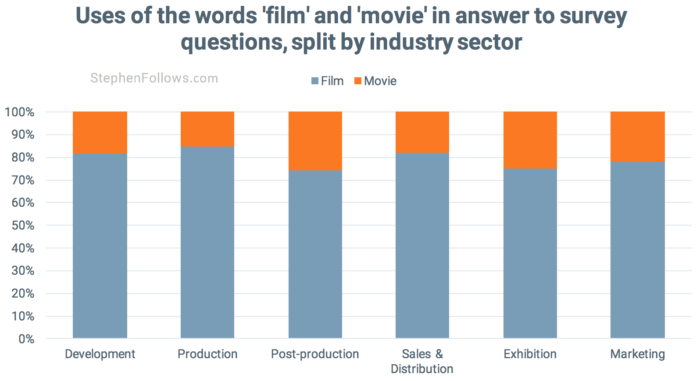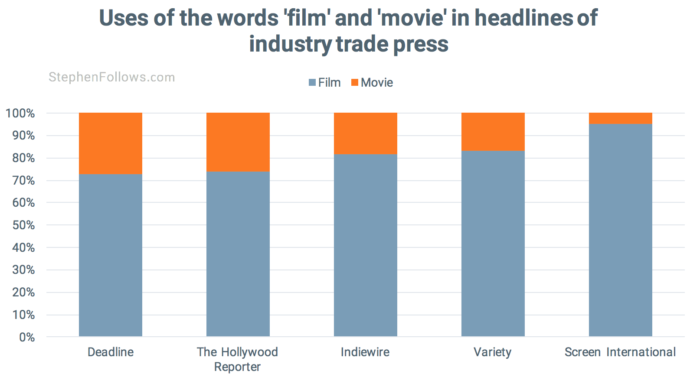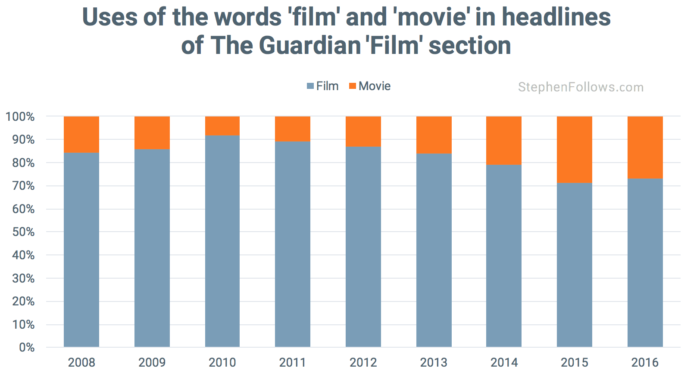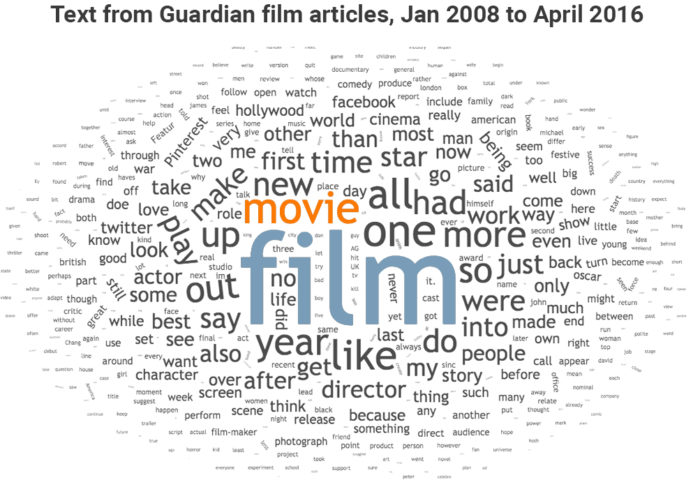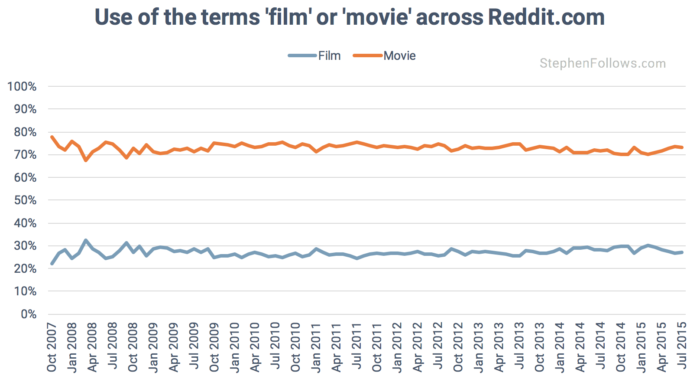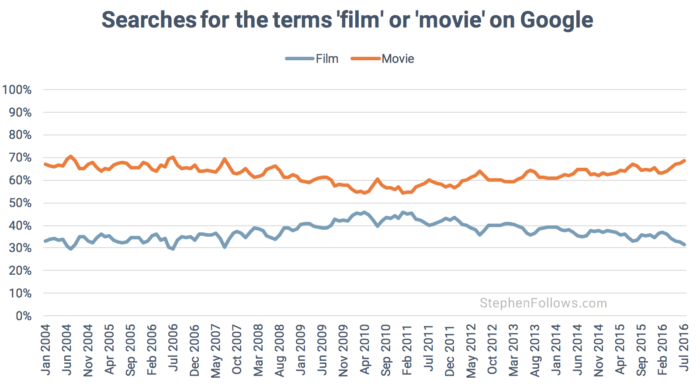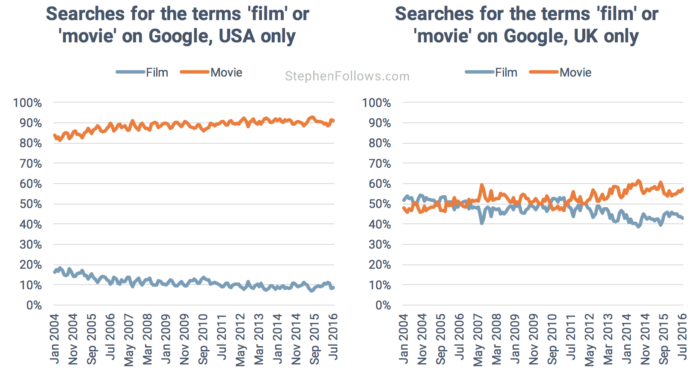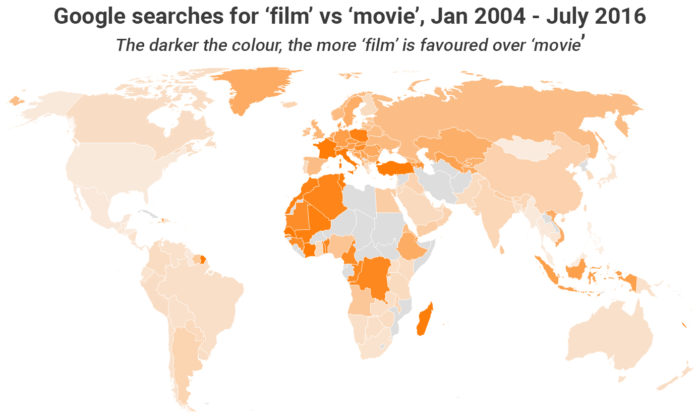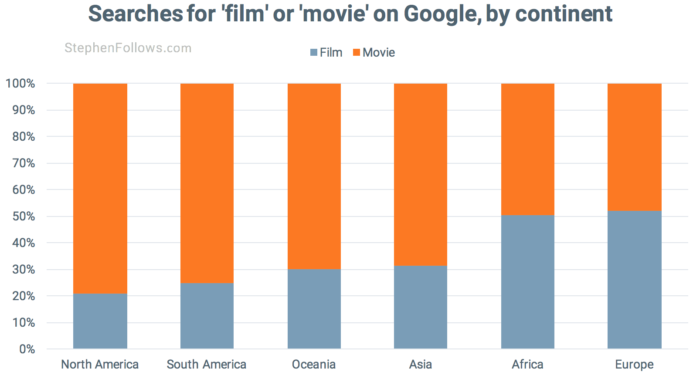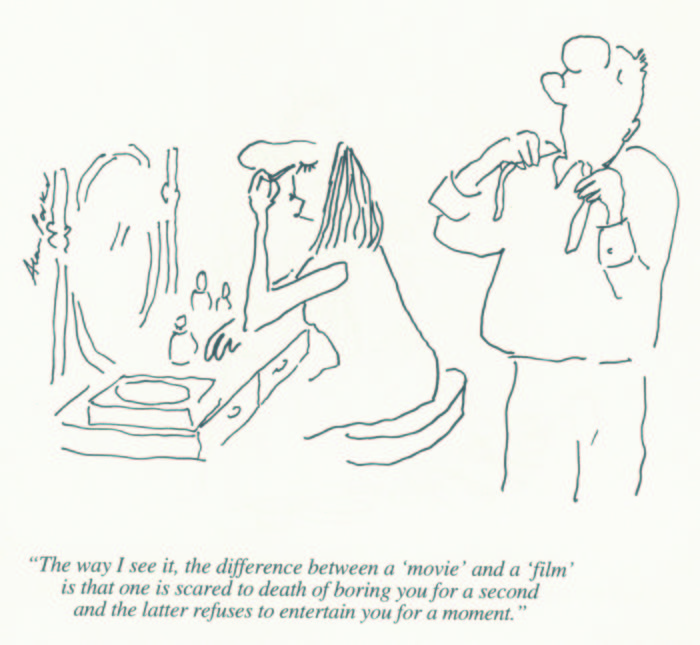Film или movie в чем разница
FILM vs MOVIE
Эти два слова очень близки: оба имеют прямое отношение к кино. Разберемся, какие между ними отличия и как правильно выбрать film или movie.
В чем разница между FILM и MOVIE?
| Have you seen this film? / Have you seen this movie? | Вы видели этот фильм? |
В современном английском эти слова используются взаимозаменяемо: выбор между film и movie зависит в основном от того, какой вариант английского языка вы используете. Film более характерен для Великобритании и Европы и чаще употребляется в письменном формате, а movie — в разговорном языке.
Film — это более старый термин, он чаще используется теми, кто работает в киноиндустрии. Movie изначально было сленговым названием кинофильма, сокращением от moving picture.
Зачастую профессионалы называют словом film серьезное кино, имеющее художественную ценность, а словом movie — легкие фильмы, созданные ради развлечения и коммерческой выгоды.
| George is producing a film about space | Джордж продюсирует фильм о космосе |
| This movie was very funny | Фильм был очень забавным |
Также у этих слов есть дополнительные значения:
Movie может использоваться в значении «место, где показывают кино»
Film может означать «пленка для киносъемок»
Урок 72. Обсуждаем кино на английском языке
 Автор: София Стальская Автор: София СтальскаяВысшее лингвистическое образование. Опыт работы 5 лет. |
Кино — популярное современное развлечение. Очень часто люди обсуждают и советуют друг другу фильмы, а значит будет полезным говорить о кино не только на родном, но и на английском языке.
Слова по теме «Кино» (прослушать)
Типов фильмов очень много, и некоторые английские названия уже прижились в русском языке, поэтому запомнить жанры кино на английском будет совсем не сложно:
horror film – фильм ужасов
science fiction film (sci-fi film) — научно-фантастический фильм
action film — боевик
historical film — исторический фильм
gangster movie — гангстерский фильм
disaster movie — фильм-катастрофа
animated film — анимационный фильм
cartoon — мультфильм
love story/ romantic film — романтический фильм
comedy — комедия
romantic comedy (rom com) — романтическая комедия
drama — драма
thriller — триллер
psychological thriller — психологический триллер
western — вестерн
musical — мюзикл
documentary — документальный фильм
Чтобы сказать «фильм», можно использовать два слова: film и movie. Разница между этими словами заключается в том, что movie часто обозначает те фильмы, которые направлены на получение коммерческой прибыли. Люди смотрят «movies», чтобы развлечься. Если вы хотите рассказать о картине, которая представляет художественную ценность и несет какой-то урок, используйте слово «film».
Прилагательные по теме «Кино» (прослушать)
Для описаний своих впечатлений от фильма вы можете использовать уже хорошо знакомые вам слова «good» и «bad», «boring» и «interesting», а также и более сложные и точные прилагательные:
scary — пугающий
exciting — увлекательный
astounding — поразительный, изумительный
silly — глупый
hilarious — очень веселый, смешной
spellbinding — завораживающий
actionpacked — полный динамики, приключений
romantic — романтичный
futuristic — футуристический
superb — превосходный, великолепный, отличный
cheesy — убогий, низкого качества
cool — клевый, классный
enjoyable — приятный
predictable — предсказуемый
ridiculous — нелепый
masterpiece — шедевр
mind-boggling — ошеломляющий, захватывающий дух
О фильме можно также сказать следующее:
It’s a blockbuster. — Это блокбастер.
It’s a low budget film. — Это фильм с низким сюжетом.
It’s based on a book. — Фильм основан на книге.
It’s subtitled. — Фильм с субтитрами.
It’s dubbed. — Фильм с дубляжом.
It’s beautifully filmed. — Фильм красиво снят.
А эти люди, чья работа связана с фильмами и телевидением:
director — режиссер
producer — продюсер
film star – кинозвезда
cast – каст, актерский состав
operator/camera man – оператор
screenwriter — сценарист
film critic – кинокритик
Часто употребляемые фразы
Чтобы описать содержание фильма используйте Present Simple и следующие фразы:
Также к теме «Кино» относятся и эти слова:
screenplay — сценарий
soundtrack — саундтрек, музыка к фильму
film reviews — рецензии на фильм
plot — сюжет
special effects – спецэффекты
film-goer – человек, который часто ходит в кино
Использование новых слов в речи. Диалоги
Что касается повседневного общения, то вы можете стать участником вот таких диалогов:
Dialogue 1.
Dialogue 2.
Задания к уроку
Задание 1. Скажите одним словом.
Задание 2. Выберите правильный ответ.
Задание 3. Дополните нужными буквами.
Ответ 2.
Ответ 3.
Difference Between | Descriptive Analysis and Comparisons
Key difference: The term ‘film’ is commonly applied to movies of an artistic or educational nature and is not expected to have broad, commercial appeal. Whereas, the term ‘movie’ is applied to commercial cinema aimed at a large viewing audience, in hopes of making profit.
Both the terms, film and movie, are used interchangeably. They are a type of visual communication which uses moving pictures and sound to tell stories or help people to learn. They are a series of pictures arranged sequentially, which run in rapid manner to create an illusion of motion. They can be made digitally or still by using photographic films. In general, there is not much difference between the two, but this article helps differentiate them by a few points.
According to Wikipedia, a film is a series of still images which, when shown on a screen, creates the illusion of moving images due to phi phenomenon. A film is created by photographing actual scenes with a motion picture camera; by photographing drawings or miniature models using traditional animation techniques; by means of computer animation; or by a combination of some or all of these techniques and other visual effects.
Film is a term referred to as the art of making motion pictures. It is the contemporary definition of cinema that communicates ideas, stories, perceptions, feelings, beauty or experiences by the means of recorded or programmed moving images along with other stimulations. It usually includes an optical soundtrack, which is a graphic recording of the spoken words, music and other sounds, which accompany the images. The soundtrack runs along a portion of the film exclusively reserved for it and is not projected. Films are considered to be cultural artifacts created by specific cultures, which are reflected and at times affected. It is considered as source of popular entertainment and a powerful medium for educating and providing information to the citizens. The visual basis of film gives it a universal power of communication.
Typically, a film is made by big productions, which includes art directions, casting and creation of scripts, and fabulous sets. It is usually projected on big screens as in the cinemas. A feature film has a running time of more than 60 minutes and a short film has a running time of 40 minutes or less.
Movie is often regarded as slang for a film. It is considered as the lesser form of the art of making a motion picture. People in every part of the world watch movies as a type of entertainment, a way to have fun. The fun refers to the people watching movies in the aspect of laughing, crying or even feeling afraid in the form of entertainment. Movies are usually made so that they can be shown at cinema or movie theatres. They are mostly commercial and are made for the sole purpose of entertainment and making money.
A movie includes dialogues, music and sound effects. It has a screenwriter, who writes the script, which is the story of the movie, a producer who hires people to work on the movie; the actors who act in the movie and the director who directs the movie. The actors memorize the words from the script that they have to say in the movie, and learn the actions that the script tells them to do. Then the director tells the actors what to do and a cameraman takes motion pictures of them with a motion picture camera. When filming is finished, an editor puts the moving pictures together as a story, within a set amount of time. Audio engineers and sound engineers record the music and the singing, which is joined to the picture. When the movie is done, many copies of the movie are made by movie labs and put onto movie reels and sent to the cinemas. The movie is now ready to be played in the big screens.
At times when the term movie is used, it may be referring to a motion picture shown in theatres intended for public or commercial viewing or home-made videos. A movie does not have a required running time. It can be made long or short as the movie maker wants.
Comparison between Film and Movie:
It is a term used for movies of an artistic or educational nature and is not expected to have broad, commercial appeal.
It is a term used for commercial cinema aimed at a large viewing audience, in hopes of making profit.
It may or may not have dialogue.
A feature film has a running time of more than 60 minutes and a short film has a running time of 40 minutes or less.
A movie does not have a required running time.
Silent movies, biographies, etc.
Action movies, comedy movies, romantic movies, etc.
Film vs movie – Which is the best term to use?
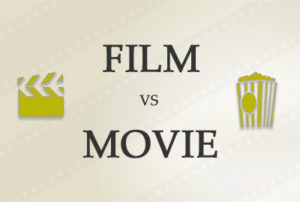
Now I’m back to writing about things other than Hollywood blockbusters and I find myself… confused. Which is the better phrase? Which of the two do most people use? What do they even mean?
So, as regular readers would expect, I have turned to the data to have a look at which term is most commonly used. It seems we need to split this question down into three smaller questions:
Industry professionals
Over the years I have conducted many interviews and surveys with industry professionals and so I went back to all the answers I got to open-ended questions. I looked at all 3,198 responses, checking for usage of the terms film and movie and grouping the results by the industry sectors the respondents worked in.
82% of the time people used either of the terms film or movie, they opted for film. The most liberal users of movie work in post-production but even they favour film to movie three-quarters of the time.
Industry press
At the start of last year I performed a big research project into the film industry press, and so I was able to analyse my cache of 239,720 industry headlines for uses of the terms film and movie.
The results were very similar, with four times as many headlines featuring film than those using movie. The UK-based publication Screen International used the term movie very infrequently (in just 115 of the 20,019 articles I looked at), foreshadowing a geographic component to this debate which I will address in a moment.
Popular press
It’s not possible for me to survey all newspapers but I wanted to take a look at least one major newspaper, to see where they sit on the film vs movie debate. I opted for the Guardian, as I felt that of all UK newspapers, they cover the largest number of media stories. I gathered data on all 10,282 articles in their film section between January 2008 and April 2016.
By looking at the headlines, we’re able to see that they too opt for film over movie, 82% of the time. Interestingly, they are using movie more frequently in recent years. In 2010 only 8.4% of the headlines feature movie over film, whereas by the start of this year that has risen to 26.8%.
The chart above only looks at the headlines so I wanted to spot-check to make sure that the text within the articles told the same story as the headlines. I couldn’t break the data down by year due to the volume (over 5.4 million words!), but I was able to calculate that film is used in place of movie 74% of the time (i.e. very similar usage as within headlines).
Below is a word cloud made from all articles published in the Guardian Film section between January 2008 and April 2016 (the more frequently a word is used, the larger is appears).
Civilians
Let’s widen our net further and look at the general public. By using the Reddit N-gram tool, we are able to track the usage of the terms film and movie across all of Reddit. This shows between October 2007 and July 2015, movie was used 73% of the time and film only 27% of the time.
I widened our study to look at all Google searches, by using the Google Trends tool. I downloaded data on searches of the phrases film and movie across 208 countries and territories, from January 2004 to July 2016. Movie is the clear winner, with an average of almost twice as many searches as film.
Regional Differences
With the Google data for so many countries, it’s possible to look at how usages for each of the two terms differs across the world. Perhaps the most interesting difference is between the UK and America. In the US, the term movie is used eight times as often as film, whereas in the UK they are as common as each other.
I have put the country-by-country data into an interactive map, but sadly WordPress doesn’t want to embed the chart on this site. Therefore, you can see the full interactive map here and I have pasted a screenshot below.
Here are some of the highlights:
When we group the countries by continent we can see that film is holding its own in Europe and Africa but overwhelmed in the Americas.
The difference in meaning
In the strictest sense, both terms can be used interchangeably. Dictionaries describe both words as describing a feature film and the Wikipedia page for Movie automatically forwards to the page for Film. However, common usage implies a subtle difference. I will leave it to the wonderful Alan Parker to explain the difference via a cartoon from his superb book Will Write And Direct For Food (the books is a must-own for all film professionals and can be bought on Amazon).
Conclusion
This quick dive into the data won’t end the debate between the two terms, but it has shown us three things:
Notes
It should be noted that the word film has other meanings than just a feature film, whereas the word movie is only used to mean a feature film (at a stretch you could say it also describes the act of going to see a film, as in “We’re going to the movies”). When looking at the industry and press usage, it’s extremely unlikely that the word film was being used to refer to anything but a feature film. The same cannot be said of the Google search but sadly there is no way to disentangle the irrelevant searches.
I could not control for population in my Google search data (meaning that my continents chart is one-country-one-vote), nor could I take account of cultural influences.
Film или movie в чем разница
Film is British English, movie is American English. You can use either one and everyone will understand.
Although film also has other uses, such as camera film in non-digital cameras.
Символ показывает уровень знания интересующего вас языка и вашу подготовку. Выбирая ваш уровень знания языка, вы говорите пользователям как им нужно писать, чтобы вы могли их понять.
Мне трудно понимать даже короткие ответы на данном языке.
Могу задавать простые вопросы и понимаю простые ответы.
Могу формулировать все виды общих вопросов. Понимаю ответы средней длины и сложности.
Понимаю ответы любой длины и сложности.


Решайте свои проблемы проще в приложении!




